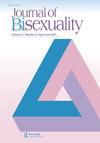性亲密伴侣暴力:对双性恋和同性恋男性的偏见对受害者指责的影响
IF 1.9
Q2 SOCIAL SCIENCES, INTERDISCIPLINARY
引用次数: 0
摘要
在性亲密伴侣暴力(SIPV)文献中,双性恋男性是研究最少的人群之一,尽管SIPV的患病率在双性恋和男同性恋之间相当,并且双性恋男性比异性恋男性更大。因此,目前尚不清楚是什么因素导致了双性恋男性受到性传播疾病相关受害者的指责。本研究采用混合方法设计来调查在SIPV背景下,对双性恋和同性恋男性的偏见态度作为受害者责备的预测因素。参与者(N = 124)被随机分配阅读一篇小短文,其中一名双性恋或同性恋男子透露了SIPV的经历。然后,参与者完成了受害者责任和对双性恋或同性恋男性的偏见态度的测量。作为定量分析的情境化手段,参与者还完成了定性刻板印象任务。结果表明,对双性恋和男同性恋者的偏见态度预测了受害者的指责,对双性恋和男同性恋者的受害者指责归因没有差异。定性研究结果表明,双性恋和男同性恋的刻板印象之间存在重叠,这可能解释了受害者对这两个群体的指责缺乏差异。这些结果表明,减少偏见和控制刻板印象加工策略可以减少受害者对性少数群体男性的责备归因。本文章由计算机程序翻译,如有差异,请以英文原文为准。
Sexual Intimate Partner Violence: Effects of Prejudice toward Bisexual and Gay Men on Victim Blame
Abstract Bisexual men are one of the least studied populations within the sexual intimate partner violence (SIPV) literature, despite the prevalence of SIPV being equivalent between bisexual and gay men, and greater in bisexual than heterosexual men. Consequently, it remains unclear as to what factors contribute to SIPV–related victim blame toward bisexual men. The current study utilized a mixed–methods design to investigate prejudiced attitudes toward bisexual and gay men as predictors of victim blame in the context of SIPV. Participants (N = 124) were randomly assigned to read a vignette wherein a bisexual or gay man disclosed an experience of SIPV. Participants then completed measures of victim blame and prejudiced attitudes toward bisexual or gay men. As a means of contextualizing the quantitative analyses, participants also completed a qualitative stereotype task. Results indicated that prejudiced attitudes toward both bisexual and gay men predicted victim blame, and that victim blame attributions toward bisexual and gay men did not differ. Qualitative findings indicated that there was overlap between the stereotypes attributed to bisexual and gay men, which may explain the lack of difference in victim blame toward the two groups. These results implicate prejudice reduction and controlled stereotype processing strategies as a means of reducing victim blame attributions toward sexual minority men.
求助全文
通过发布文献求助,成功后即可免费获取论文全文。
去求助
来源期刊

Journal of Bisexuality
SOCIAL SCIENCES, INTERDISCIPLINARY-
CiteScore
2.60
自引率
17.60%
发文量
32
期刊介绍:
The Washington Quarterly (TWQ) is a journal of global affairs that analyzes strategic security challenges, changes, and their public policy implications. TWQ is published out of one of the world"s preeminent international policy institutions, the Center for Strategic and International Studies (CSIS), and addresses topics such as: •The U.S. role in the world •Emerging great powers: Europe, China, Russia, India, and Japan •Regional issues and flashpoints, particularly in the Middle East and Asia •Weapons of mass destruction proliferation and missile defenses •Global perspectives to reduce terrorism
 求助内容:
求助内容: 应助结果提醒方式:
应助结果提醒方式:


